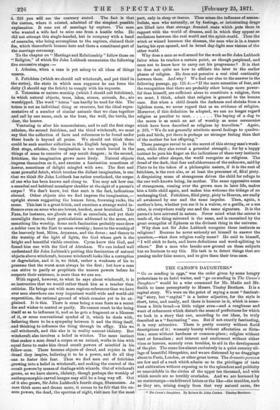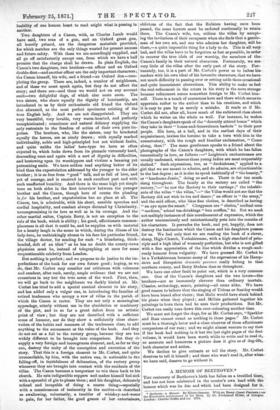THE CANON'S DAUGHTERS.* " Go on sending in eggs," was
the order given by some hungry pedestrians to an hotel waiter, and " go on sending in The Canon's Daughters" would be a wise command for Mr. Mudie and Mr. Smith to issue peremptorily to Messrs. Tinsley Brothers. It is a capital story. We were on the point of saying a most "fascinat- ing " story, but " capital " is a better adjective, for the style is short, terse, and manly, and there is humour in it, which is some- times a little broad—a little vulgar even—and a roughness and want of refinement which disturb the sense of perfectness for which we look in a story that can, according to our ideas, be truly described as a " fascinating " one. But if not exactly fascinating, it is very attractive. There is pretty country without florid descriptions of it ; womanly beauty without affectation or flirta- tion; sense without hardness or common-place ; religion without cant or formalism ; and interest and excitement without either vices or horrors, scarcely even troubles, to aid in the development of the plot. The scene lies almost exclusively in a quiet country vil- lage of beautiful Shropshire, and we are distressed by no draggings about to Paris, London, or other great towns. The dramatis persona: are few and of a rank which admits us to the privileges of taste and cultivation without exposing us to the splendour and publicity so unavoidable in the circles of the upper ten thousand, and with which novels are so terribly overladen. And we are harassed by no contretemps—undelivered letters or the like—the troubles, such as they are, arising simply from that very natural cause, the
* The Canon's Daughters. By Robert St John Corbet. Tinsley Brothers.
inability of one human heart to read aright what is passing in another.
Two daughters of a Canon, with, as Charles Lamb would have said, two sons of a gun, and an Oxford great gun, all heavily primed, are the dangerous materials provided, for which matches are the only things wanted for present success and future safety. With these we are accordingly supplied, and all go off satisfactorily except one, from which we have a half promise that the charge shall be drawn. In plain English, the Canon's two daughters, two brothers—an officer and an Oxford double-first—and another officer are the only important characters ; the Canon himself, his wife, and a friend—an Oxford don—com- pleting the group. There are, indeed, a number of neighbours, and of these we must speak again, but they do not affect the story; and there are—and these we would not on any account omit—two delightful dogs, of which also more anon. The two sisters, who share equally the dignity of heroineship, are introduced to us by their enthusiastic old friend the Oxford don aforesaid, as the most perfect specimens existing of the true English lady. And we are not disappointed. They are very beautiful, very lovable, very warm-hearted, and perfectly unsophisticated ; conscience and natural delicacy supplying the only restraints to the freedom of action of their own pure im- pulses. The brothers, who, like the sisters. may be bracketed equally the heroes, are as nicely drawn ; with equally marked individuality, noble and high-principled but not without faults, and quite unlike the ladies' hero-type we have so often objected to, which looks down from its pinnacle virtuously hard, descending once and again with a sort of dignity in difficulties, and bestowing upon its worshippers and victims a beaming yet patronizing smile. We have seldom read anything better of its kind than the expostulation addressed by the younger to the elder brother ; it is so free from " good " talk, and so full of love, and yet of courage, and is received in such excellent part and with such unaffected humility. And there is the same high yet simple tone on both sides in the first interview between the younger brother and the Canon, though here of coarse the pleading is for his brother, and expostulation has no place at all. The Canon, too, is admirable, with his short, sensible speeches and cordial hospitality, and conduct always dictated by Christianity, uncompromising in its love as well as in its courage. And the other martial suitor, Captain Berry, is not an exception to the rule of the book, which is ability ; his good, affectionate common- placeness is all that it could be, and he supplies us with material for a hearty laugh in the scene in which, during the illness of his lady-love, he unthinkingly abuses to his face his particular friend, the village doctor, for sending for such " a blundering, thick- headed, dolt of an idiot" as he has no doubt the county-town physician must be, instead of telegraphing at once for some unquestionable celebrity from London.
But nothing is perfect ; and we propose to do justice to the im- perfections of the book for our own future good ; hoping, as we do, that Mr. Corbet may consider our criticisms with calmness and candour, after such, surely, ample evidence that we are not censorious in any but the true sense of the word. First, then, we will go back to the neighbours we darkly hinted at. Mr. Corbet has tried to add a special comical element to his story, and has added only a vulgar one, in introducing the families of retired tradesmen who occupy a row of villas in the parish of which the Canon is rector. They are not only a meaningless appendage, utterly without use in the elucidation or machinery of the plot, and in so far a great defect from an artistic point of view ; but they are not described with a sufficient sense of humour, nor do they show a sufficiently close obser- vation of the habits and manners of the tradesman class, to add anything to the amusement or the value of the book. And they do not act as a foil to the rectory group, because they are too widely different to be brought into comparison. But they do supply a very foreign and incongruous element, and, as far as they can, destroy the unity of the conception and execution of the story. That this is a foreign element to Mr. Corbet, and quite irreconcilable, by him, with the native one, is noticeable in the falling-off, in truthfulness of delineation, of the rectory group whenever they are brought into contact with the residents of the villas. The. Canon becomes a temporiser to win them back to his church. He eats indigestible suppers and makes himself feel sick with a spoonful of gin to please them ; and his daughter, delicately refined and incapable of doing a coarse thing—especially with a consciousness of insincerity in the motive—is described as swallowing, voluntarily, a tumbler of whiskey-and-water to gain, for her father, the good graces of her entertainers,
oblivious of the fact that the Rubicon having once been pained, the same horrors must be endured continually to retain them. The Canon's wife, too, utilizes the villas by accept- ing the invitations of their occupants when she finds that a gentle- man of her own set, and one who admires her daughter, will be there,—a quite impossible thing for a lady to do. This is all very bad, and the villas have to be forgotten as fast as possible, in order to recover the true idols of our worship, the members of the.
Canon's family in their natural characters. Fortunately, we see- very little of the villas after the early part of the story. For- tunately, too, it is a part of Mr. Corbet's power so to imbue his.
readers with his own ideal of his favourite characters, that we have- not much difficulty in passing over or setting aside these occasional and quite inconsistent aberrations. This ability to make us feel• the real refinement in the actors in his story is the more strange because refinement seems somewhat foreign to Mr. Corbet him-
self. There is a touch of coarseness here and there which seems to. appertain rather to the author than to his creations, and which it is easy to pass by as merely a mistake. It reads as if Mr. Corbet did not, after all, know much of the cultivated class about which he writes on the whole so well. For instance, he makes. the Canon's daughters speak of the " decently attired bones " which. they take in their " bones-and-benevolence baskets " to their poor people. His hero, at a ball, and in the earliest days of their acquaintance, invites the heroine to take a turn with him in the conservatory, with the rough and familiar exclamation, " Come along, then!" The same gentleman speaks to a friend about the photographs of the Canon's daughters, with which he has fallen romantically in love, as follows :--" Leighton's enchantresses are
usually undressed, whereas these young ladies are most respectably clothed." Such expressions, too, as " chickishness," applied to a.
girl that we are meant to admire, and do admire, are objectionable to the last degree ; as it is also to speak habitually of " the beauty," or " handsome Jessie," doing so and so. There is far too much
slang throughout. The family at the rectory are called " the
rectory,"—" he saw the Rectory to their carriage ;" the inhabit- ants of the villas " the villas,"—" the Villas would not see that the
Rectory did not wish to tea and dance ;" an officer is " the army,"- and the said officer, who likes fine clothes, is described as having " an eye upon the smart." Clergymen are " clerics," medical men " medicos," school tea-drinkings " bun scuffles," &c. But we nee& not multiply instances of this unrefutement of expression, which the- author unconsciously and unintentionally puts into the mouths of his characters. It pervades the book, and yet, happily, does not destroy the fascination which the Canon and his daughters possess.
for us. We feel only that we are reading the book of a clever,. sharp, High-Church, Yorkshireman, with a high standard of prin-
ciple and a high ideal of womanly perfection, but who is not gifted with a fine appreciation of the line which divides a rough-and- ready humour from vulgarity. We have guessed Mr. Corbet to be a Yorkshireman because many of the expressions of his Hamp- shire and Shropshire dramatis persona: really belong to that. northern county, and Betty Dodson does so throughout.
We have one other fault to point out, which is a very common one. One of the Canon's daughters and the two lovers—the brothers—are so immensely cleverer than ordinary mortals_ Classics, archaeology, music, painting—all come alike. We have good reason to believe that the singing of Titiena or Santley would, have been hissed after theirs ; that Hallo would have slunk behind. his piano when they played ; and Millais gathered together his paintings to burn them had he seen their productions. But Mr.. Corbet can easily tone down this over-colouring another time.
We must not forget the dogs, for as Mr. Corbet says, " Sparkler and Ross cannot count as nothing in these pages." Mr. Corbet-
must be a thorough lover and a close observer of these affectionate- companions of our race ; and we might almost venture to say that-
if the book had nothing in it but the last eight pages of the first volume, it would have been worth while to write and to read it,. so accurate and humorous a picture does it give us of dog-life,. both character and action.
We decline to give extracts or tell the story. Mr. Corbet. deserves to tell it himself ; and those who won't read it, after what. we have said, deserve to go without it.



































 Previous page
Previous page